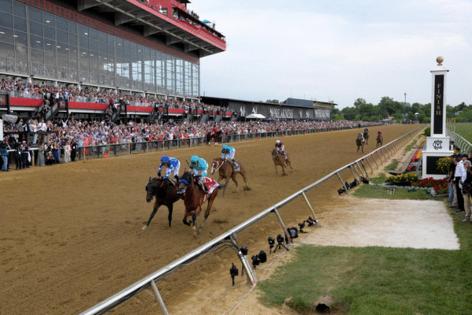Maryland horse racing bill begins 3-week sprint for General Assembly approval
Published in Horse Racing
BALTIMORE — If a plan to revive Maryland’s thoroughbred racing industry by building new facilities in the state with public money and organizing a state-created racing operator actually comes to fruition, a bill will need to sprint through Annapolis over the next three weeks.
During the legislation’s first hearing Tuesday before the House Ways and Means Committee, a Republican leader expressed “skepticism” about the financial future of the horse industry. Meanwhile, the Democratic president of the Senate warned that legislators would not issue a “blank check” to keep the sport alive in Maryland.
The bill was proposed last week at the eleventh hour of this year’s General Assembly session.
While the historic Pimlico Race Course in Baltimore has sat in disrepair for decades and prior efforts to renovate the track were “unfortunately a failure,” Maryland Thoroughbred Racetrack Operating Authority Chair Greg Cross told the committee that the new proposal would allow the racing industry to control its own future, boosted by a thoroughly renovated Pimlico and a new training track.
“This time is different,” he said.
He faced questions from delegates, however, who worried that a state-created operator would have trouble breaking even on racing in the state, since the current operator, The Stronach Group, has lost money in recent years. House Minority Leader Jason Buckel, of Allegany County, said he had a “healthy degree of skepticism” about the proposal.
“I’m just concerned about the future of horse racing in terms of, we get two, three, four, five, 10 years down the road and it turns out we’re losing money every year and then it has to be additionally subsidized,” Buckel said.
The racing industry receives money generated by taxes on slot machines at casinos. If the current plan is passed, it would benefit from $400 million in state bonds, which would be used to construct Pimlico and the training track.
Beyond those state investments, Cross has said the state would not need to subsidize the industry’s operation.
“We’re asking for the investment, premised on the fact the horsemen will be responsible for balancing the books,” Cross said.
The plan calls for a nonprofit to take over control of racing operations in the state from Stronach, the Canadian company that owns Pimlico in Northwest Baltimore and Laurel Park in Anne Arundel County. Stronach would donate Pimlico, the home of the Preakness Stakes, to the racing authority. The company would retain Laurel Park, which, in a few years, would no longer host races for the first time in a century. Roughly 140 racing days would take place at Pimlico each year.
The nonprofit, Cross told legislators, would be called the Maryland Jockey Club as part of the racing authority’s agreement with Stronach.
For the intellectual property related to Preakness weekend each May, the nonprofit would annually pay Stronach a licensing fee of $3 million — plus 2% of the total money wagered over the weekend. In recent years, gross handle has been about $100 million, meaning the the nonprofit would likely pay Stronach about $5 million annually.
Under the plan, the state would issue $400 million in bonds — at least $250 million of which would go toward Pimlico and at least $110 million of which would go toward a training center in either Bowie, Woodbine or Aberdeen. Those bonds would then be paid off over decades using at least $17 million a year.
Where those funds will come from is complicated.
State revenues generated by taxing slot machines at casinos go into a few buckets, including a racetrack renewal fund, an account that boosts racing purses, as well as Baltimore City coffers.
That racetrack renewal fund, however, will slowly sunset over the next decade as that money is redirected to a state education fund. By the 2033 fiscal year, that racetrack fund will no longer receive slot money, leaving revenues generated by the state’s lottery — money that would otherwise go to the general fund — to pay off some of those racing bonds.
The bill faced friendly fire in the equine industry Tuesday from standardbred interests. Standardbreds, as opposed to thoroughbreds, are used in harness racing at two Maryland tracks: Rosecroft Raceway in Prince George’s County and Ocean Downs in Worcester County on the Eastern Shore. Some testimony focused on negative impacts of the bill’s plan to divert revenue from standardbred tracks to Pimlico, a thoroughbred track.
“Bottom line is, if they take that money away, it’ll probably kill the standardbred industry,” said Michael Hall, a Marylander who trains and owns portions of 45 standardbred horses.
The bill is at the start of the legislative process, meaning it needs committee approval before seeking the necessary votes from both chambers before the session ends on April 8. There’s a “long road ahead,” said Sen. President Bill Ferguson, a Baltimore Democrat.
“I think there is some apprehension within our membership,” he said. “We are committed to trying to salvage what we can to make sure that the horse industry is viable in Maryland, but it doesn’t come with a blank check.”
———
Baltimore Sun reporter Hannah Gaskill contributed to this article.
©2024 Baltimore Sun. Visit baltimoresun.com. Distributed by Tribune Content Agency, LLC.







Comments